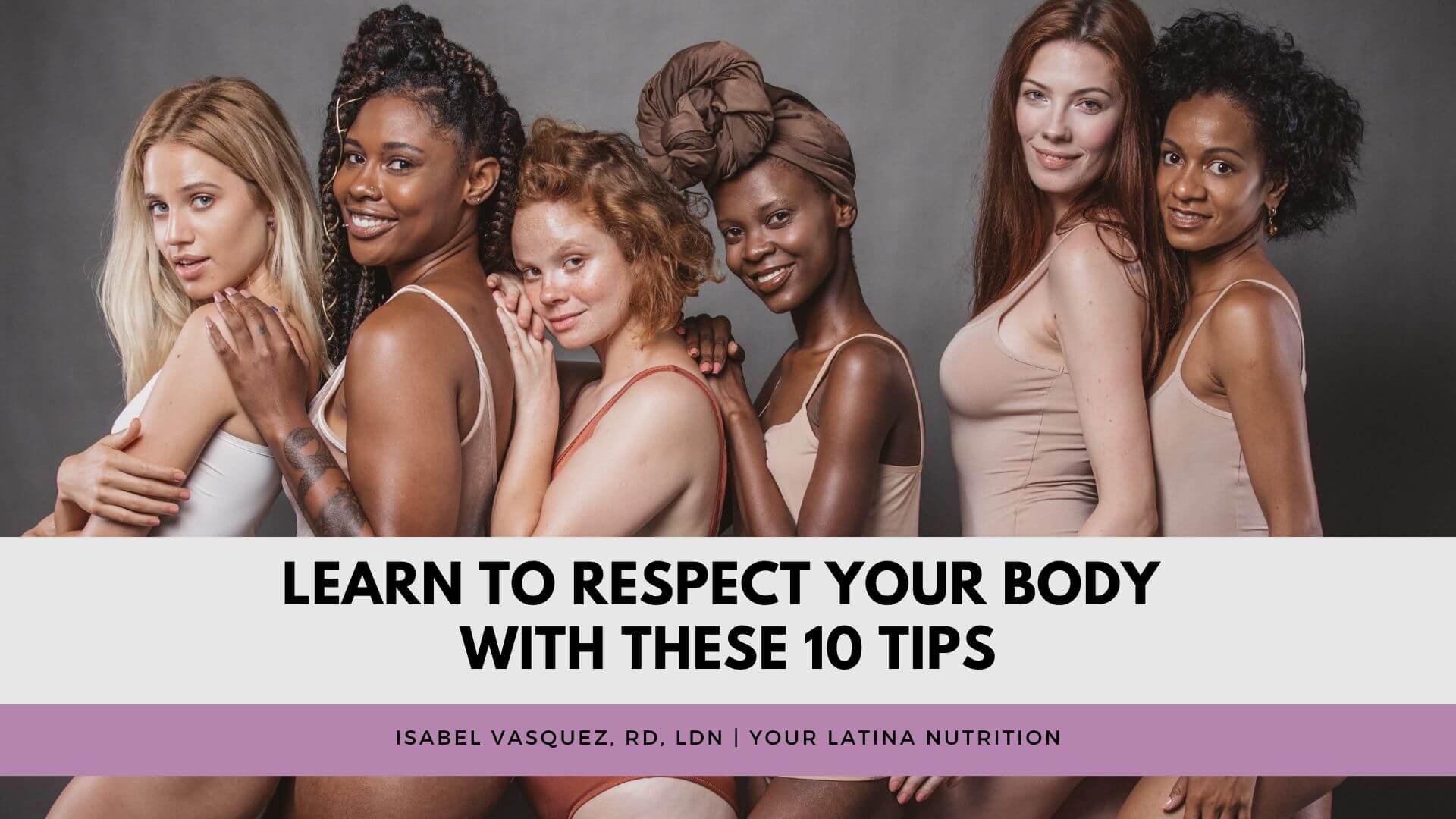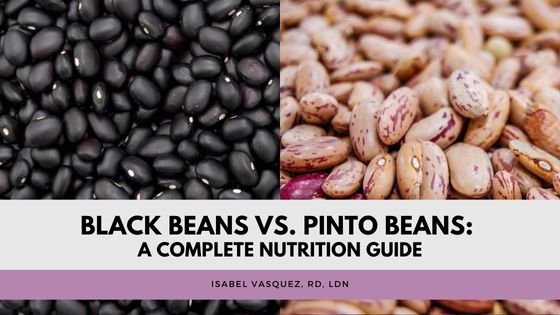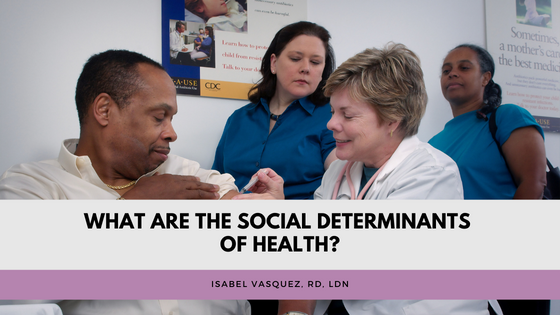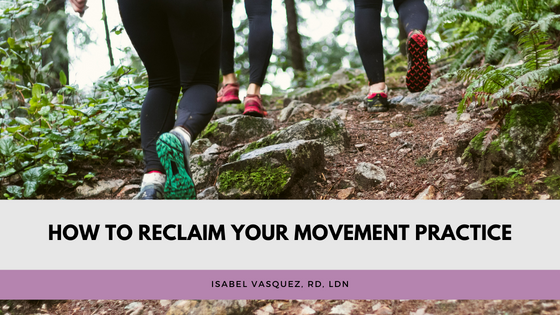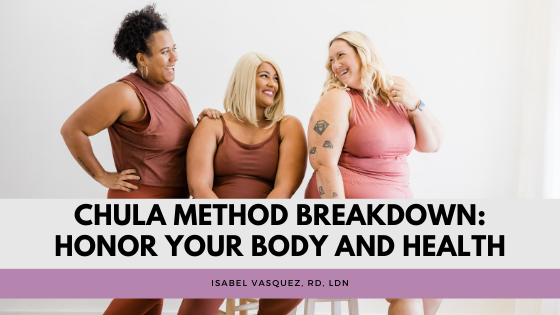
Chula, ven con gusto
In the Your Latina Nutrition blog, we help you learn to nourish & respect your body without harsh food rules, overcome cycles of bingeing and restriction, and embrace your here-and-now body.
You can do this all while keeping your cultural foods alive & adopting health-promoting behaviors.
Enjoy our research-backed articles written by registered dietitians Isabel and Dalina!
Blog Categories
ALL POSTS | RECIPES | INTUITIVE EATING | JOYFUL MOVEMENT | BODY IMAGE | GENTLE NUTRITION | CULTURA
What is a HAES Dietitian? Plus, What to Expect Working With One.
A HAES dietitian can help promote your health without centering weight. Learn what a HAES dietitian does and whether you’d benefit from working with a HAES dietitian.
Intuitive Eating Before and After: What Results to Expect
Before and after photos are all too common, but they can cause real harm. Learn what before and after transformations to expect with intuitive eating, plus whether weight loss can be achieved with this non-diet approach.
What to Eat When You Don't Know What to Eat: 60 meal ideas
Not knowing what to eat happens to all of us, yet we need regular meals to feel good and stay energized. Learn 3 ways to navigate this, plus 60 meal ideas.
Intuitive Movement: What It Is and 8 Tips to Embrace It
Exercise has a rigid connotation that can turn people off. Intuitive movement, on the other hand, invites you to connect with your body and let that guide your physical activity. Learn what it is, and 8 tips to practice it.
Learn to Respect Your Body With These 10 Tips
Body respect takes work, but it can help you build a better relationship with your body. We share 10 dietitian-approved tips to build respect for your body.
An Alternative to Dieting For When You're Done Counting Every Calorie
Fad diets have been popular for decades if not centuries. But the reality is, they don’t work and can actively harm your health. Learn an alternative to diets that can help you feel better in your body.
Black Beans vs. Pinto Beans: A Complete Nutrition Guide
If you’re Latine or if you’ve been to a Latin American restaurant, then you know that black and pinto beans are culturally prevalent in Latin America. We love our beans, and these are two of the most common types we eat. But you may wonder how they differ and if one is better for health. Here, we share the key differences and similarities between black and pinto beans.
What Are The Social Determinants of Health?
The social determinants of health account for systemic factors—those outside of people’s control—that impact health. Learn what these factors are and how they impact health.
Is MSG Really Bad For Me?
Many associate MSG with harmful effects on health; however, this association isn’t backed by research. In fact, it’s rooted in xenophobia and racism. Learn MSG’s effects on health and how it got such a bad rap.
Are Beans Nutritious?
Beans are a good source of carbs, fiber, protein, and micronutrients. Learn more about their nutrition, plus the research-backed benefits of eating beans.
How to Reclaim Your Movement Practice From Diet Culture
Movement doesn’t have to be a life-long struggle. Working towards detangling movement from diet culture not only promotes more sustainable, fun movement, it can also promote bone health, heart health, stress reduction, and boost your mood.
Busting the "If You Eat Like Me You Can Look Like Me" Myth
We’ve all heard judgments or seen content implying that our weight is predominantly determined by what and how much we eat. Yet, this idea is highly stigmatizing specifically towards larger-bodied folks. Learn 4 reasons why this is a complete myth so you can start to accept your body.
C.H.U.L.A. Method Breakdown: Honor Your Body and Health
Breaking free from diet culture does not mean ignoring your health. It means that instead of centering your weight and being rigid with your eating, you incorporate health-promoting behaviors without needing to go to extremes. Learn how the CHULA method helps you honor your body and health.
What is Health at Every Size?
HAES entails fat activism and acknowledges weight stigma and weight cycling as problems that negatively impact the health of larger-bodied individuals. It de-centers weight as a primary health marker and instead, places focus on health-promoting behaviors.
3 Things I Learned From My Abuela About Food
If we are consistently eating way past comfortable fullness due to pressure from our families, we probably aren’t honoring our bodies. Yet, we don’t want to disrespect our abuelas or mothers by saying no. We can work on setting kind boundaries - things like “Abuela, the food was amazing! I’m full now, but can I please have some to take home with me?”
Does Weight Equal Health?
Weight and health have become one in the same in our society steeped in diet culture. Actively working to unlearn this is the foundation of a Health At Every Size approach. Learn what the research says on how weight cycling and weight stigma impact health outcomes.
What is Intuitive Eating?
In the last few months, you may have seen the words “intuitive eating” floating around the internet and social media. #intuitiveeating may occasionally pop up on your Instagram feed, or you may have even seen it discussed on the news.
Created in 1995 by two registered dietitians, Evelyn Tribole and Elyse Resch, intuitive eating is a non-diet, weight-inclusive approach to nutrition. It focuses on listening to your body’s unique needs and your own intuition when nourishing yourself. No foods are off limits (unless there are medical reasons you cannot eat certain foods, such as food allergies), so you break free of the harsh food rules typical of most diets.





